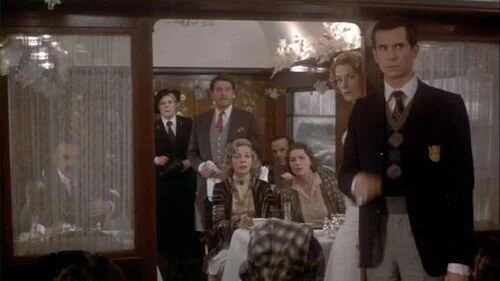The Whodunit: Why We Love Them
Okay, I won’t lie. I got held up playing Among Us like a hell of a lot of us (unless we’re acting our own age, of course… oops) as of late. It’s fun. I can’t deny it. I can’t speak for everyone else, but I can blame my love for the whodunit genre on this. I figured a quick think piece for today would be why we’re so attached to this genre, even if we haven’t seen much from it lately (aside from this game, which is two years old now, and the occasional work like Knives Out). In short, it feels almost human to work your brain and fulfil the job of a narrative (to put together information that creates a story). How great does it feel to figure out the murderer? Even if you’re way off, the whodunit genre is full of ample amounts of opportunities for you to predict the outcome of another person’s work. When a film is too predictable, that’s a bit more unsatisfactory. For a whodunit? It’s a privilege to be ahead of the detective or lead characters.
In Among Us, we take part in a bit of a different way; like other murder mystery games, we have to figure out which player is lying. When we read novels or watch films, we don’t really have that luxury; we’re simply distanced witnesses. On one hand, that removes a certain involvement. On the other (when it comes to film), we really are left scrambling in a linearly moving medium, piecing together what we can as time doesn’t wait for us. It’s all the more challenging in a film, and that’s exactly what I love about it. Also, unlike games (where you have different outcomes every different game), the films won’t change (unless you’re watching different versions of Clue or the like). You can go back and see exactly what you missed the first time, and read the liars for the deceivers they are. With novels, you have the advantage of reading at your own pace, so you can really dissect each and every possible clue.
Murder on the Orient Express.
The one commonality I can find between more interactive versions and films or novels, is being pitted against strangers. While it’s obvious when you’re online in a video game (unless you play locally with loved ones or acquaintances), it’s something that may not get brought up often enough with murder mysteries. I love clever forms of exposition in a film, since that’s an incredibly difficult task to pull off. In great murder mysteries, we’re left facing people we know extremely little about, and we slowly learn about them (whilst trying to figure out who committed whatever crime). It’s an incredibly bright way to get us invested in every person in these stories; it’s also a fantastic excuse to make a colourful cast of characters of all walks of life, of whom would usually never wind up together (especially in a remote location, like a destination vacation, a party, or on transit). While you’re figuring out clues, you’re also bonding with people. It also makes the revelation of the guilty character(s) even more damning; you were rooting for them! Why did it have to be them??
All in all, murder mysteries are something that have seemingly departed from film for the most part, outside of, again, the occasional example. I find that’s mostly because it has found new life in other interactive experiences, including (especially) games. It’s so much fun to try and figure out which of your family members or friends is the liar this round; we see a more playful side of those we thought we knew inside and out. Instead of this being a one person exercise (or a handful of people if they’re all watching the same feature), this is now a larger experience, and one that can be relived in new ways many times. It can’t get old. Maybe the focused attention on these games — including Among Us — as well as the recent interest in remakes (like the Kenneth Branagh ones) and tributes like Knives Out, will create a new urgency for the genre to come back. With all biases considered, I’d personally like that, even if for a little while (especially if we get to new original stories, and away from remakes where we know the outcome).
Andreas Babiolakis has a Masters degree in Film and Photography Preservation and Collections Management from Ryerson University, as well as a Bachelors degree in Cinema Studies from York University. His favourite times of year are the Criterion Collection flash sales and the annual Toronto International Film Festival.




